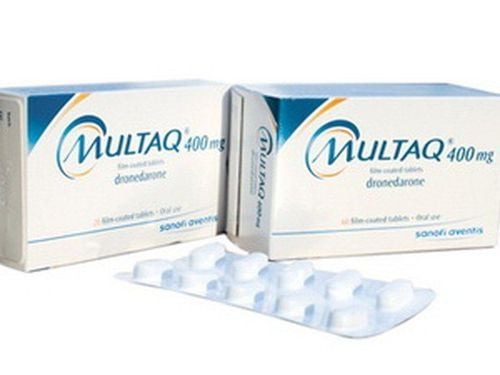This is an automatically translated article.
The article is professionally consulted by Specialist Doctor I Tran Quoc Vinh - Emergency Doctor - Department of Resuscitation - Emergency - Vinmec Nha Trang International General Hospital.The leading complication among the complications that patients face with rheumatoid arthritis is cardiovascular complications. Rheumatoid arthritis increases the risk of cardiovascular diseases such as heart attack, stroke and atherosclerosis (the accumulation of fat, cholesterol and plaque on the walls of blood vessels) by twofold.
1. Why are patients with rheumatoid arthritis at high cardiovascular risk?
Rheumatoid arthritis is a chronic autoimmune disease with the participation of many factors such as: infection, location, genetics, age, gender, environment.. So far, the exact cause is not clear. . When antigens enter the body, the body initiates a chain of inflammatory reactions. These inflammatory factors in addition to attacking the joints causing joint damage can also attack many other organs of the body, including the heart.Dr. Daniel H. Solomon, Harvard Medical School - Boston - a leading researcher in cardiovascular disease and rheumatoid arthritis said that the mechanism of inflammation in rheumatoid arthritis and heart disease is similar. In rheumatoid arthritis, inflammation attacks the synovial membrane — the thin layer of tissue that connects joints — but inflammation can also spread to other organs, including the heart. One of the possible victims is the endothelium, which is the innermost layer of blood vessels. Inflammation damages the lining of blood vessels, and excess muscle plaque builds up. This fatty plaque narrows the arteries, increases blood pressure and reduces blood flow to the heart and other organs.
In a 2015 study entitled "An overview of the nature of Rheumatism", British investigators found that rheumatoid arthritis patients had a higher risk of atherosclerosis than the general population and advance at a faster pace. Plaque is also more brittle and fragile, more dangerous in causing a heart attack or stroke. In fact, the risk of ischemic stroke caused by a blood clot in an artery that supplies blood to the brain is almost twice as high in patients with rheumatoid arthritis. Atherosclerosis begins early in the course of rheumatoid arthritis - often before joint symptoms appear - and progresses rapidly after a patient is diagnosed with Rheumatoid Arthritis.
Inflammation doesn't just damage the heart arteries. It also affects veins, increasing the risk of deep vein thrombosis (DVT) and pulmonary embolism - blood clots in the legs or lungs. A 2012 Mayo Clinic study found that the risk of DVT was three times higher in people with Rheumatoid Arthritis, and the risk of life-threatening pulmonary embolism was four times higher.
Several other studies, including one published in the Mayo Clinic "BioMed Research International" journal, have found that patients with Rheumatoid Arthritis have an increased risk of atrial fibrillation (AF). increased the risk of stroke fivefold.) was significantly higher. Research has also shown a link between diastolic dysfunction, an abnormality in how the heart fills with blood, and atrial fibrillation, and patients with rheumatoid arthritis are known to have an increased rate of diastolic dysfunction.
Pericarditis – the sac with a double membrane surrounding the heart is also commonly seen in patients with Rheumatoid Arthritis. The two layers of inflammatory membrane rub against each other, causing the patient to have severe, sharp chest pain.

2. In-depth risk assessment
Figuring out how inflammation and other risk factors affect rheumatic heart disease will help doctors identify and treat high-risk patients earlier, before they have symptoms. Our challenge is that current methods of assessing cardiovascular disease risk, based on a patient's medical history and lifestyle information to assess cardiovascular risk over 5 years, are not very effective. with patients with rheumatoid arthritis. For one thing, the standard risk assessment method does not take into account the effects of inflammation or drugs.Dr. Solomon shared: “Right now, our ambition is to find a more effective method of risk assessment.” In the May 2015 issue of Arthritis and Rheumatism, he and colleagues published an assessment and extension method specific to Rheumatoid Arthritis. In addition to traditional cardiovascular risk factors, they included disease activity, disability, prednisone use, and years of rheumatoid arthritis. Researchers have found an assessment method that includes risk classification compared to traditional risk assessment methods.
3. Benefits for the patient

Although Dr. Davis says there's no one-size-fits-all approach, prevention strategies often include aggressive rheumatoid arthritis treatment to keep inflammation under tight control; limit the use of drugs harmful to the heart; and assist patients in their efforts to manage lifestyle factors known to be associated with heart disease. Lifestyle changes, such as doing physical activity, eating a healthy diet, and seeing your doctor regularly to minimize side effects from medications, can help reduce your risk of heart disease. And above all, if you are smoking, stop immediately.
Doctor Tran Quoc Vinh has more than 6 years of working experience (starting in 2011) in the field of Emergency Medicine, he used to work at the Emergency Department of Khanh Hoa Provincial General Hospital, participated in medical examination and treatment. for many clinics in Nha Trang area before becoming a doctor of emergency department at Vinmec Nha Trang International General Hospital as it is today.
Please dial HOTLINE for more information or register for an appointment HERE. Download MyVinmec app to make appointments faster and to manage your bookings easily.
Article references source: NCBI, Webmd.com













